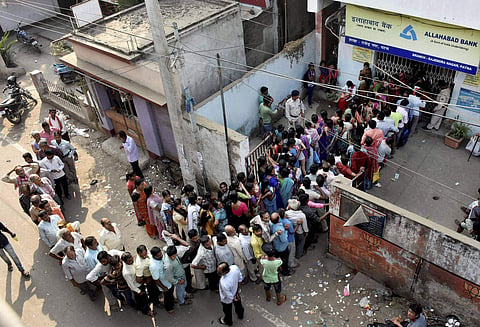

The Modi government might have transferred crores to the bank accounts of Indians but they are still having trouble accessing these funds. According to the data collected by India–COVID Assessment and Response Dashboard (I-CARD), an independent project of a group of researchers housed at the Azim Premji University, the livelihood of people is still under threat. Not only are they having trouble dealing with the new normal and the regulation changes, travelling to the bank more times means that they are spending more money to access these funds.
The I-CARD dashboard, which now plots data collected in the first round — May 13 to June 6, shows that parts of Madhya Pradesh, Chhattisgarh, Odisha and Uttar Pradesh are the worst hit with a score of 1 on a scale of 1 to 3. The second phase of data collection is still on and the block-level experts or representatives of I-CARD have reported that people are having problems accessing their own funds in rural India. "There are not as many banks in the remote areas and they have to bear the cost of travel to the bank every time the government transfers funds. Even when they reach the bank, their worries are not over. Some have complained that the bank employees have misused social distancing norms to not work while some said they had to travel to the bank more than once because they shut shop early or because there were not as many employees But this is not the general condition across India, just an illustration of the worst-hit areas. Some of the new procedures framed to practice social distancing norms, even though necessary, actually hinder the process of withdrawing money," said Ankit Saraf, Program Manager, I-CARD. "If they are spending, say Rs 200 to withdraw Rs 500 deposited in their account then what is the use? Some of the people have not been able to access their own savings or money sent by their relatives from elsewhere. The access to the funds is a major issue," added Ankit, who is part of a 42-member team of researchers from various institutes across the country who have volunteered for the project.
Another sector, the data pinpoints, that has been affected is the basic healthcare provided by the Anganwadi and ASHA workers. MP, UP and Chattisgarh are the ones with the lowest numbers in this sector and the Round 2 data might not be an improvement either. "While the workers are trying hard, they simply do not have the manpower to handle both COVID and non-COVID issues. As a result, vaccinations are being missed out in some blocks and the regular work that these workers do is being overlooked. This can have long-term effects on children and vulnerable populations as a whole ," Ankit explained.
The I-CARD Dashboard has information available on food security, healthcare, financial access, livelihoods, social relations, and the situation of migrants. Data is available for more than 200 blocks across Jharkhand, Bihar, Chhattisgarh, Madhya Pradesh, Uttar Pradesh, Odisha, Rajasthan, West Bengal, and Maharashtra. "The data on our Dashboard is free for all and if someone wants specific data pertaining to a region or particular parameters they can also email us and we will send the data righ through. As of now, many NGOs are using this data to work better and direct their forces where they needed the most. The NGOs and CSOs are also facing a lot of trouble working on the ground level as mobility was a constraint during the lockdown. While we aim to refresh the data twice a month, we are only being able to do it once a month now," said Ankit and explained how the process works. "The organisations we work with sending us a list of Block Experts whom we talk to to find out if they are biased or not and what actual experience and knowledge they have about the block. Once they are vetted, we send them a set of question which they study over a few days and then collect the data from their network. This process has been delayed due to mobility and transportation constraints. After that, our team members call these block experts to collect the data and we compile and analyse it," he added.
